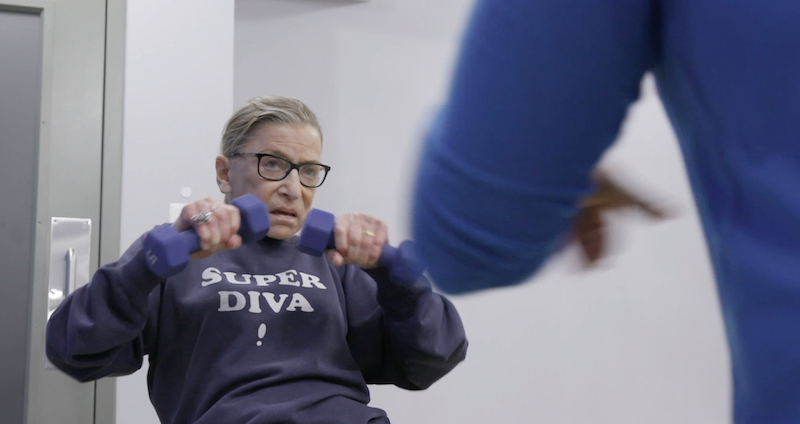
Justice Ruth Bader Ginsburg has been famous for several decades but only recently has she become a bonafide icon. There were a few factors contributing to this shift. The first was, undoubtedly, the newish nickname she has acquired: The Notorious RBG. It’s funny—considering her diminutive stature and utter lack of notoriety—and it has a #FeeltheBern level of catchiness. The second is her gradual shift to the left, a necessity brought on by the Supreme Court becoming, well, more right wing. (It’s not Bader Ginsburg’s nature to be a dissenter—she’s more of a coalition builder—but dissent she must.) And finally there’s the disconnect between her stamina, her brilliance, her intellectual fierceness, and her apparent physical fragility. She is 85 years old, the oldest serving Supreme Court justice. She looks like she could be felled by a particularly strong wind. She recently overcame a bout with pancreatic cancer. And yet she persists.
Despite all that, the question remains, how well do we really know her? I knew a few trivial things—like the fact that she loves opera and that she somehow managed to be good buds with the late Justice Scalia, despite their gaping ideological differences. But watching RBG, Julie Cohen and Betsy West’s intimate and informative documentary on Bader Ginsburg, I realized that there’s so much about this extraordinary woman that I didn’t know.
She was a trailblazer, of course, but in the most quiet, put-her-head-down-and-get-stuff-done sort of way. She was appalled by the Red Scare of the 1950s, how American citizens were dragged in front of Congress and accused of being un-American or worse, but she saw that lawyers were there to help them. So she went to Harvard Law School—she was one of only a handful of women in a class of 500—and was soon contributing to the Harvard Law Review. She was a star, and her husband, Marty—also a lawyer, and no intellectual slouch himself—recognized this fact and stepped aside to allow her career to take center stage.
The marriage between Marty and Ruth is explored in some depth in RBG, and is one of the more touching—and telling—aspects of the film. Marty, who died in 2010, was good natured and garrulous, so he made a perfect foil for her, as she has always been both studious and a workaholic. They adored each other, but it’s important to note that Bader Ginsburg credits Marty with allowing her to have her success—not just helping to raise their two children, but boasting about her, promoting her, working his connections to advance her career, not his own. Indeed, it was Marty who got her on Bill Clinton’s short list—so to speak—for the Supreme Court. (Clinton himself is interviewed in the film and he notes that the minute he met Ruth, and promptly got absorbed in an intense legal conversation with her, he knew she was the one.)
The film also takes us through Bader Ginsburg’s early career when she was an advocate for women at the ACLU who argued milestone cases—like one involving equal housing benefits for female service members and another having to do with a woman’s right to serve on a jury—in front of the Supreme Court. Again and again, she won her cases by dazzling judges with her elevated rhetoric and simply being the most prepared and knowledgeable person in the room. The film makes it clear that even her staunchest ideological foes were eventually forced to grudgingly admire her.
And we see a more personal side of Bader Ginsburg, too, including a few scenes with her college-aged granddaughter, who calls her “bubbe” (Yiddish for grandmother) as they look through old notes and photos; a scene where she proudly tells a crowd that she knows who the Notorious B.I.G. is and believes they have a lot in common; and an adorable scene where West and Cohen present her with Kate McKinnon’s hilarious impression of her on Weekend Update. (“Is this Saturday Night Live?” Bader Ginsburg asks, giggling with glee.) We also see Bader Ginsburg at the gym, lifting weights and doing push-ups in her “Super Diva!” sweatshirt (and making me feel highly inadequate). And we see her deliver a cheeky performance on stage at the Kennedy Center with the Washington National Opera, much to the delight of the crowd.
I went into RBG as a fan of Bader Ginsburg and I left an even bigger fan, with a greater appreciation of her intellect, her work ethic, her bone-deep decency, and her commitment to justice. What an American success story. What a woman.
